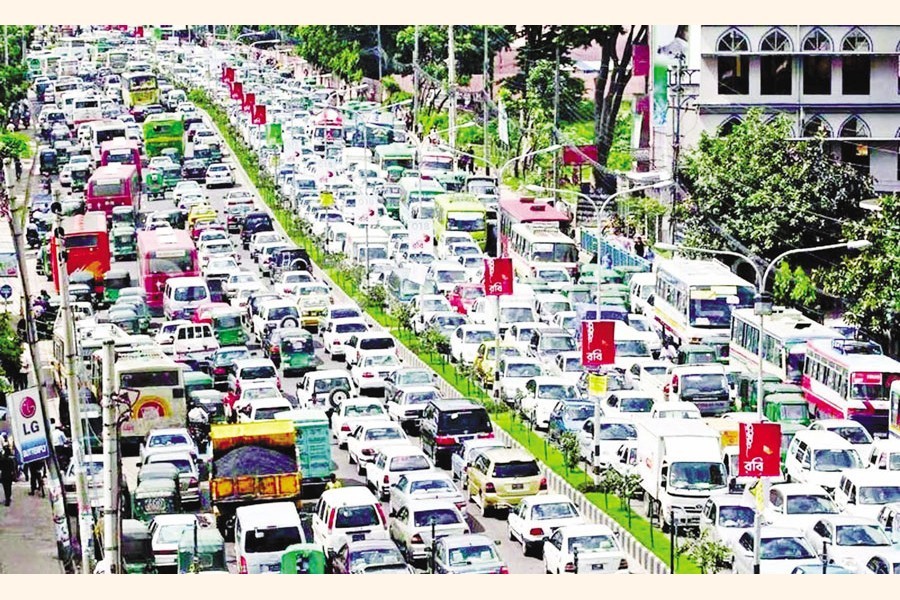The introduction of new working hours aimed at conserving energy has touched off an early morning scramble on the streets of Dhaka as commuters joined the rush of school-goers across the city.
Amid a lingering energy crisis, Bangladesh decided to cut back working hours at government offices, autonomous institutions and banks, starting Wednesday.
With offices now opening at 8:00am, an hour earlier than usual, the new timetable has seemingly changed the face of the city. Most neighbourhoods were abuzz with rickshaws and other vehicles by 7:30 am, even as all shops, with the exception of eateries and grocery shops, were shuttered.
Government and private vehicles accompanied buses on the streets during the early morning rush. But areas such as Azimpur, Palashi Intersection, Shikkha Bhaban and the Gulistan Zero Point were largely free of any congestion, reports bdnews24.com.
Abdur Rashid, a traffic policeman, was on duty at the Azimpur Bus Stand. The rush of vehicles that customarily occurred around 9 am started around 7:30 am, he said.
The new timetable has meant that traffic policemen must come to work an hour and a half earlier than usual, said Md Sabuj, a traffic sergeant marshalling the Shikkha Bhaban area.
Whereas before, his work started between 6:30 am and 7:00 am, on Wednesday, he had to report for duty at 5:30 am.
Rickshaw driver Badrul was also coming to grips with the increased number of vehicles on the road in the morning. "I used to take children to school without too many issues. But today, there's a raft of vehicles on the road, which wasn't the case before."
Although visitors were scarce, officials were seen scurrying into the Secretariat, with work starting at 8 am. However, some arrived a bit late. "It's the first day of the new timetable. That's why," said one official with a wry smile when asked why he was late.
The parking spots at the Secretariat, however, were filled by 8:00am.
LGRD Minister Tajul Islam reached the Secretariat on time. Although the working hours have been reduced, it will not hinder the work of the administration, according to him.
“The new office hours will not affect the services provided by government offices. I've already been informed that all officers have arrived on time. We can provide normal services under the new schedule,” he said.
The Russia-Ukraine war has continued to roil the international oil market, and its ripple effects are being felt in the domestic food and energy sectors.
Against the backdrop of spiralling energy costs, the government has adopted numerous austerity measures, including rolling blackouts, to avert a full-blown economic crisis.
“We’ll be able to save ourselves the troubles faced by other countries if we take preventive measures now," said Tajul. "It's not wise to waste anything and it’ll have an adverse impact on the national economy. We must stop wasting resources.”
Bangladesh must take every opportunity to save power and energy, the minister said, adding that in many countries in Europe and around the world, shopping malls now close at 6 pm.
But the government is yet to decide on how long the new work timetable will stay in effect, Tajul said.
PUBLIC TRANSPORT IN SHORT SUPPLY
Md Jashimuddin, 60, came to the Kajla Bus Stop in Jatrabari around 7:00am as he had an appointment with an eye doctor in Shyamoli. But he could not find a bus until 8:15am as they were all overcrowded.
"I came early in the morning thinking I would get to my appointment on time and without any hassle. But, I found that there were hardly a few buses and those were packed to the brim. Usually, you don't see so many people here this early in the morning," he said.
Buses from Matuail, Shanir Akhra, Kajla and Jatrabari travel to Gulistan, Motijheel, and also to Gabtoli via Dhaka Medical College and New Market.
Government officials, students of different universities and colleges and staff in commercial organisations travel on these routes.
The peak hours on these routes are from 8:30 am to 11 am.
But on the first day of the new office schedule, most of the commuters gathered at the bus stop before 7 am.
However, the number of public transports available for office-goers in the morning was almost half of what it usually is, said Rukhsana Zaman, 35, a banker seeking a ride to Motijheel.
"Although banks open to clients at 9 am, we have to sign in at least half an hour before that. Since today is the first day [of new office timing], I came to the bus stop at 7:30 am. But I waited for 40 minutes but still couldn't get a bus," she said.
"Everyone is jostling to get on board when a bus arrives. But it's not possible for me to fight through the crowd."
Rukhsana saw a long-haul bus taking in a few passengers travelling within Dhaka city. She got on that bus, but had to pay a bit more than the usual fare.
The bus stops at Matuail, Shanir Akhra and Kajla were teeming with passengers from 7 am to 8:30 am.
Some passengers stood in the middle of the road as public transports were few and far between.
They hailed and stopped buses before the vehicles could reach their designated stops. This raised the risk of accidents, but bus drivers were cautious.
A few government buses bound for ministries were seen at the Kajla Bus Stop at 8 am, which is at least a 30-minute drive from Motijheel and the Secretariat under normal circumstances.


